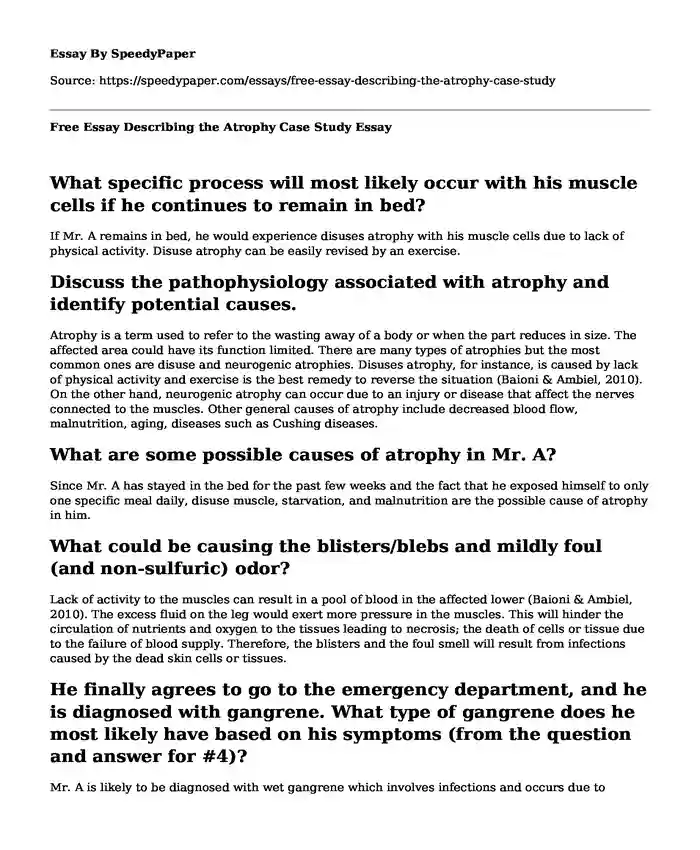What specific process will most likely occur with his muscle cells if he continues to remain in bed?
If Mr. A remains in bed, he would experience disuses atrophy with his muscle cells due to lack of physical activity. Disuse atrophy can be easily revised by an exercise.
Discuss the pathophysiology associated with atrophy and identify potential causes.
Atrophy is a term used to refer to the wasting away of a body or when the part reduces in size. The affected area could have its function limited. There are many types of atrophies but the most common ones are disuse and neurogenic atrophies. Disuses atrophy, for instance, is caused by lack of physical activity and exercise is the best remedy to reverse the situation (Baioni & Ambiel, 2010). On the other hand, neurogenic atrophy can occur due to an injury or disease that affect the nerves connected to the muscles. Other general causes of atrophy include decreased blood flow, malnutrition, aging, diseases such as Cushing diseases.
What are some possible causes of atrophy in Mr. A?
Since Mr. A has stayed in the bed for the past few weeks and the fact that he exposed himself to only one specific meal daily, disuse muscle, starvation, and malnutrition are the possible cause of atrophy in him.
What could be causing the blisters/blebs and mildly foul (and non-sulfuric) odor?
Lack of activity to the muscles can result in a pool of blood in the affected lower (Baioni & Ambiel, 2010). The excess fluid on the leg would exert more pressure in the muscles. This will hinder the circulation of nutrients and oxygen to the tissues leading to necrosis; the death of cells or tissue due to the failure of blood supply. Therefore, the blisters and the foul smell will result from infections caused by the dead skin cells or tissues.
He finally agrees to go to the emergency department, and he is diagnosed with gangrene. What type of gangrene does he most likely have based on his symptoms (from the question and answer for #4)?
Mr. A is likely to be diagnosed with wet gangrene which involves infections and occurs due to impaired body supply to the affected area. This kind of gangrene is referred to as "wet" since it involves pus that results when the tissues swells and blisters (Jackman & Kandarian, 2004).
Identify and describe the manifestations associated with the three types of gangrene.
Dry gangrene
This kind of gangrene mostly is associated with body organs such as the liver, muscles, and heart etc. It emerges when one body part is not working properly due to an insufficient oxygen supply. Eventually, the body cells or tissue will begin to deteriorate and die. Here, there is no sign of infection at all
Wet gangrene
Wet gangrene occurs when injury affects a body part that results in a limited blood supply leading to the death of the cells and increased risk of infection. Actually, almost every case of gangrene involves an infection. It is associated with blisters and foul smell. The infection can spread rapidly in other parts of the body.
Gas gangrene
This a rare but a dreadful type of gangrene. It occurs due to a severe infection that get deep into the body i.e. deeper inside the muscles or organs as a result of trauma (Bonaldo & Sandri, 2013). The bacteria that cause gas gangrene is called clostridia. Victims of this gangrene develop a pale and gray skin. Without treatment within 48 hours, the victim risks the loss of life
References
Baioni, M. T., & Ambiel, C. R. (2010). Spinal muscular atrophy: diagnosis, treatment and future prospects. Jornal de pediatria, 86(4), 261-270.
Bonaldo, P., & Sandri, M. (2013). Cellular and molecular mechanisms of muscle atrophy. Disease models & mechanisms, 6(1), 25-39.
Jackman, R. W., & Kandarian, S. C. (2004). The molecular basis of skeletal muscle atrophy. American Journal of Physiology-Cell Physiology, 287(4), C834-C843.
Cite this page
Free Essay Describing the Atrophy Case Study. (2022, Nov 07). Retrieved from https://speedypaper.com/essays/free-essay-describing-the-atrophy-case-study
Request Removal
If you are the original author of this essay and no longer wish to have it published on the SpeedyPaper website, please click below to request its removal:
- Apartment Design Plan in Our Free Essay Sample
- Free Essay on the Vision of a Future Physical Therapist
- Essay Example on the King Leopold's Ghost Documentary
- Essay Sample with the Native Times Report on Same Sex Marriages
- Human Development during Middle Age, Free Essay in Psychology
- Free Essay on Sustainable Development and Hospitality Industry
- Role of Government in Health Care - Paper Sample
Popular categories





